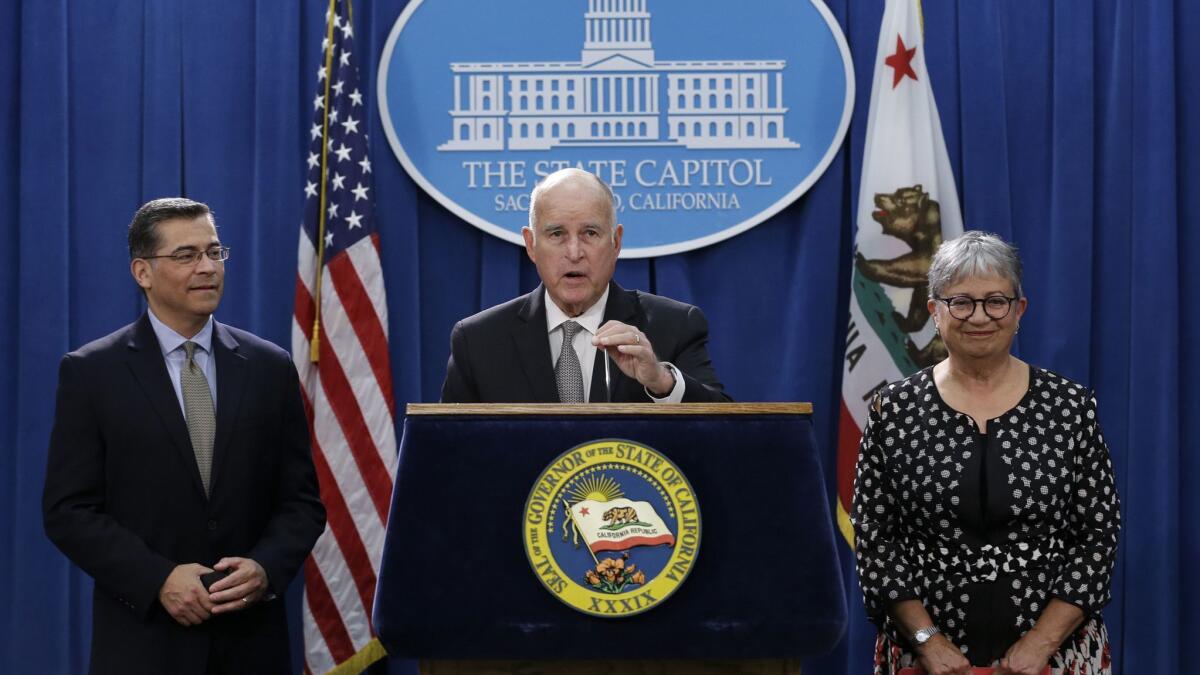Editorial: Defending California’s right to clean air

- Share via
World leaders may negotiate their climate change accords in foreign capitals, but the efforts to stem global warming may succeed or fail based on what happens in United States courtrooms, where the state of California is leading the charge to block the Trump administration’s anti-environment, anti-science agenda.
On Tuesday, Gov. Jerry Brown and state Atty. Gen. Xavier Becerra announced that they have filed the state’s 10th, and potentially most consequential, lawsuit against the U.S. Environmental Protection Agency. Joined by 16 other states and the District of Columbia, California is trying to preserve a planned increase in vehicle fuel-economy standards, which were designed to make passenger cars more fuel efficient and less polluting.
Adopted under the Obama administration, the clean-car regulations were a crucial piece of the national effort to curb greenhouse gas emissions and slow global climate change. And California, which has the unique authority to set its own vehicle emission standards, had agreed to forgo more stringent standards in favor of national regulations that would have a bigger impact on greenhouse gases.
But then the Climate Change Denier-in-Chief took office and appointed his anti-environmental-protection sidekick, Scott Pruitt, to head the EPA. Last month Pruitt announced the agency would abandon the stiffer fuel economy requirements that were supposed to be phased in from 2022 to 2025. Pruitt is widely expected to weaken — or even eliminate — fuel efficiency standards, and he is reportedly looking to do so in a way that effectively overrides California’s authority to adopt its own rules.
An attack on California’s authority would not only hinder the Golden State’s ability to clean up the air; it would stymie a dozen other states that have adopted California’s vehicle emissions standards. And that would cripple efforts to combat climate change: Cars and trucks recently surpassed power plants as America’s largest source of greenhouse gas emissions.
Cars and trucks recently surpassed power plants as America’s largest source of greenhouse gas emissions.
The clean-car rules were slated to improve the average fuel economy of new cars and trucks by 50% by 2025, to almost 55 miles per gallon. To meet the new standards, automakers were expected to develop and sell more hybrid and electric models, which, over time, would slash oil consumption, smoggy tailpipe pollutants and greenhouse gas emissions.
California’s lawsuit argues that the EPA acted arbitrarily to overturn the clean-car standards, violating its own rules and the Clean Air Act. Becerra said the federal government offered no evidence to support its decision.
Brown had harsher words, calling Pruitt an “outlaw” and accusing him and President Trump of leading the country off a cliff and into disaster.
“We’re losing our battle on climate change,” Brown told reporters Tuesday. “This is an existential threat to America, to California and the world.”
California leaders rightly recognize the threat that Pruitt and Trump present. Fortunately, so do 16 other states. The coalition formed to fight the EPA’s clean-car rollback represents approximately 43% of the new car sales market nationally and 44% of the U.S. population. That should make it abundantly clear to the Trump administration and to the automakers lobbying for looser standards that there is no desire to go backward on climate change and clean air.
Follow the Opinion section on Twitter @latimesopinionand Facebook
More to Read
A cure for the common opinion
Get thought-provoking perspectives with our weekly newsletter.
You may occasionally receive promotional content from the Los Angeles Times.






